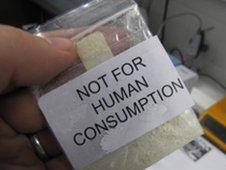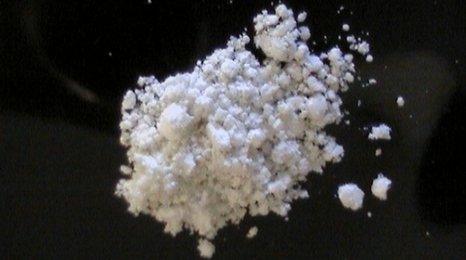Tests find banned drugs on British legal high sites
- Published
A number of British websites are breaking the law by selling so-called legal highs made from banned class B drugs, a Newsbeat investigation has found.
Tests on five different products bought from online shops showed most contained chemicals already illegal under the Misuse of Drugs Act.
Police are warning anyone caught with the powders could face prosecution and end up with a criminal record.
"The risks are and the consequences are serious," said Deputy Chief Constable Simon Byrne from the Association of Chief Police Officers.
"If we analyse it and find it's unlawful then that could carry a five year sentence for possession.
"If you are buying large quantities and selling it on to friends then that's possession with intent to supply which carries a prison sentence of up to 14 years."
New legal highs continue to flood the market since mephedrone and naphyrone were banned earlier this year.
Sold as plant food
Most are manufactured in the Far East and imported to the UK where they are sold as research chemicals or plant food to get round the law governing the sale of medicines.

New legal highs have flooded the market since mephedrone was banned
But tests on a random sample of five products bought by Newsbeat from different British websites showed most contained a cocktail of banned material.
Two were made from mephedrone itself mixed with prescription drugs while another contained lesser known class B drugs, MDPV and fluromethcathinone, mixed with lidocaine, an anaesthetic typically used to cut cocaine.
Tests on a fourth were less conclusive but appeared to show it contained a different class B substance, still known by its chemical name 4-Methyl-N-ethylcathinone.
"Clearly we need some law enforcement," said Dr John Ramsay, a toxologist at St George's Hospital, who carried out the tests.
"We need the police to raid some of these shops and demonstrate what they are doing is illegal and wrong."
Imported from China
British websites buy the chemicals in bulk from China and might not be aware they are breaking the law, he added.
"They probably trust their wholesalers to supply them with something legal but it is their responsibility to make sure what they are selling to the public is safe and they cannot possibly do that," he said.
There is already evidence that customers buying these substances have been arrested and prosecuted.
Twenty-one-year-old Jack, not his real name, was placed on electronic curfew after getting caught with less than ten grams of what he believed was a legal high.
"I thought if you could get it off the internet then it couldn't be that bad," he said.
"It didn't really affect me until I turned up to a party and suddenly got really paranoid. I just had no idea what was going on."
Criminal record
Jack reacted badly to the substance he was taking and spent two days on a life support machine in a coma.
"I woke up and the police told me it was mephedrone and a load of class B drugs I'd never heard of," he said. "To come back as illegal was a real kick in the teeth and now I've got a criminal record. These sites should be shut down."
The websites selling the four banned drugs tested by Newsbeat all said they were given guarantees by their suppliers and were shocked by the results.
One immediately closed for business although there is evidence the person behind it is still selling legal highs under another name.
Three other sites said they have temporarily removed the products from sale while they conduct their own tests.
Police said they are now taking the issue "very seriously" and will take action if there is evidence they are selling banned substances.
"Policing the internet is difficult because as soon as you shut one site down another pops up but that's just one of the dilemma of the modern age," said Deputy Chief Constable Simon Byrne.
"The simple message is if you are suspicious about what you are being offered, then don't buy it because it could be illegal and get you a criminal record for life."
- Published13 January 2010

- Published25 September 2009